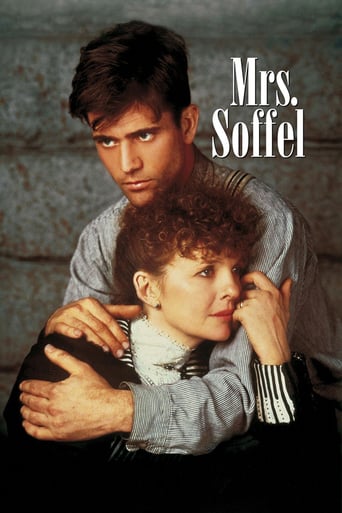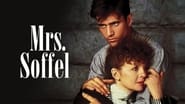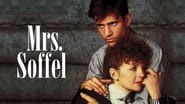skullislandsurferdotcom
Somewhere between BADLANDS and DEAD MAN WALKING lies MRS. SOFFEL, a time-period melodrama about a warden's Christian wife, played by a wistful Diane Keaton, who, while handing out bibles on death row, gets enamored with a slick, handsome folk hero, a young Mel Gibson soon to be hanged with younger brother Matthew Modine.Whether it's true love, or the fact Gibson's character (who sounds strangely like Eric Roberts) has a way of conning naïve women, the underlying passion between the polar opposites, with the gray prison bars between them, is an engaging buildup to the inevitable escape and, during the final act the trio: Keaton, Gibson and Modine, ride a sled through the snowy winter with Terry O'Quinn's posse on their tail. The romantic aspect is somewhat thin – if Gibson resembled an everyman prisoner, would we have a film at all? But the direction, gorgeous cinematography and apt performances provide a spellbinding combination of style and substance, although there's more of the first than the latter.For More Interviews: http://cultfilmfreakreviews.blogspot.com
contact356
This is a visually beautiful movie bringing the story along in with obvious and subtle references. The title character is a trapped woman. The 'noblesse oblige'of being the warden's wife coupled with her own frustrations and frailties makes her life intolerable. She loves her children; she hates her life. Here, she becomes intrigued by a prisoner in her husband's jail. He appeals to her imagination as well as her sensibility as a woman. She finds a soul-mate in their exchanges as she pretends to read-him-to-reform from bible passages. She flees with him and is willing to die with him to keep from returning to her unbearable life. This is based on a true story. But it is a telling of the story of women, most of whom until the last 25 years or so, had little choice but to marry and to identify themselves in terms of their husbands. Their identity was not their own; their choices had to be appropriate to their marriage station; they were judged by how well they maintained husband's well being and their children's achievements. While much has changed in women's lives, vestiges of the past still do exist. The references to "baking cookies" in the 2004 presidential campaign signals this. Mrs. Soffel represents the lives of women over time. She desperately seeks the love and freedom that her standing in life denies her. This has been a common women's theme.
Jugu Abraham
Australian director Gillian Armstrong makes great films with strong women characters--her earlier Australian film "My brilliant career" being a perfect example. I watched "Mrs. Soffel" because of my admiration for Armstrong and found that "Mrs. Soffel" could not hold a candle to "My brilliant career" even though American actress Diane Keaton was admirable compared to the Australian actresses in the latter.Armstrong had the talented Australian cinematographer Russel Boyd (who was responsible for the seminal works of Peter Weir and Bruce Beresford) once again to work with. While Armstrong and Boyd used justifiably darkened interior shots, I had problems seeing anything for long periods and had to rely on the soundtrack! Armstrong loves to develop the female characters but leaves the male characters totally undeveloped (Mr Soffel and Jack Biddle). This is one reason I prefer the works of Weir and Beresford over Armstrong--even though her latent talent cannot be ignored. It is amazing to see Soffel's daughter getting equal or more prominence in the script than Mr Soffel towards the end.Mel Gibson has made a name for himself by directing "Braveheart," but I give more credence to his acting phase in Australia ("Tim", "Mad Max", etc.). I am convinced that he is a director's actor--doing well with good directors. In "Mrs Soffel" Armstrong has evidently invested time with Diane Keaton, who carries the film. Gibson only lends support to her thanks more to the script than his acting capabilities.Most of the fine tribe of Australian filmmakers of the Seventies have drifted to the US to become richer and gain international recognition--but their work in Australia in the Seventies remains unsurpassed.
Tanechka
"Mrs. Soffel", a movie much overlooked in the mid 1980s, deserves a reevaluation at present. With the advent of so many successful period films, "Mrs. Soffel" can be seen as a predecessor of sorts. The movie, a true story filmed on location in Pittsburgh, PA, is one of exquisite beauty and restrained passion. The emotions evoked by it are comparable to those produced by the more modern "The Age of Innocence" and "The Remains of the Day". The doomed couple, played by Diane Keaton and Mel Gibson have an extraordinary chemistry which smolders throughout the entire film. In addition, the cinematography is beautiful (for something filmed in 1984, it's almost remarkable how effective the atmosphere is!). Do not look towards this movie if you are seeking unbridled romance or breath taking action. The rewards of "Mrs. Soffel" are far more cerebral.





